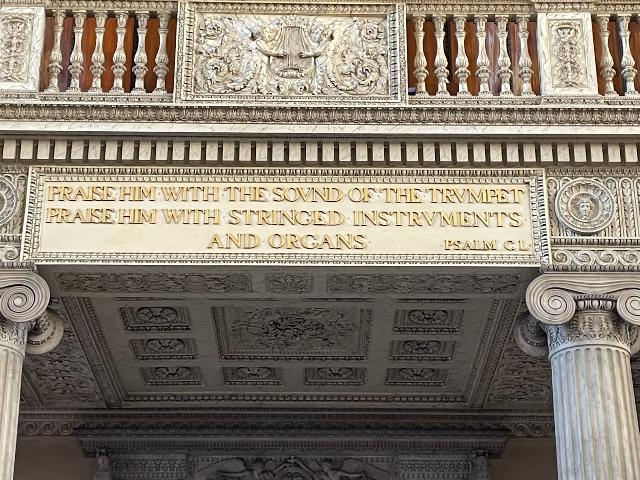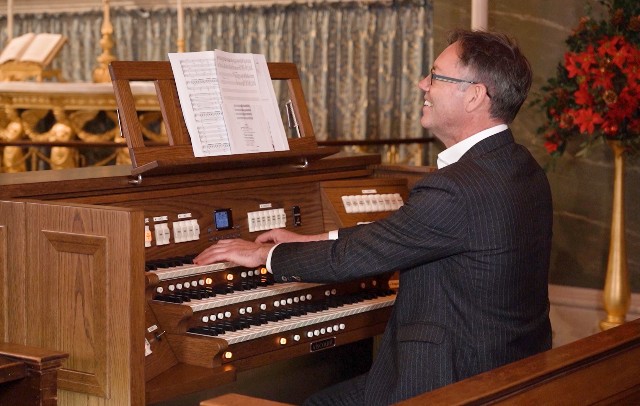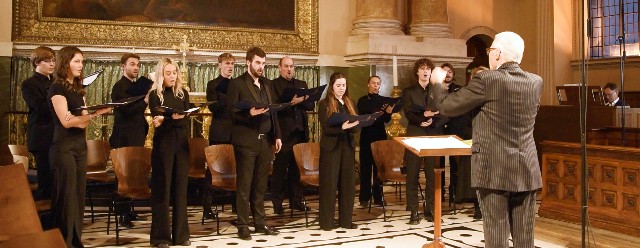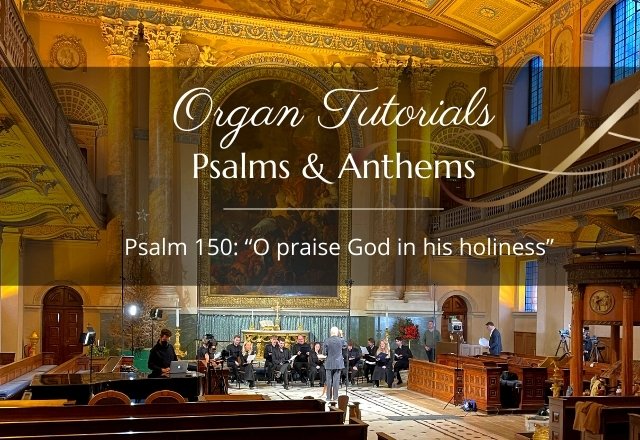With Ralph Allwood, Mark Shepherd, and the Old Royal Naval College Trinity Laban Chapel Choir
The great psalm of praise, number 150: “O praise God in his holiness”, features as the first in this tutorial series on Psalms and Anthems.
You’ll be able to see Ralph Allwood teaching the Old Royal Naval College Trinity Laban Chapel Choir about the subtleties of performance, and get some ideas about organ accompaniment from the playing of Mark Shepherd. It seems fitting that a quotation from this psalm appears underneath the Samuel Green organ that dominates the gallery at the back of the chapel.

Psalm 150 – the last psalm in the book
As explained in the introduction to this series, psalm accompaniment has a lot to do with word painting. Psalm 150, the last psalm in the book, is one of the big ones, although short, often providing the organist with a rare opportunity to let rip with some big noises.
The words, as shown below, feature a range of instruments originally used for praise in the temple, including trumpet, lute, harp, and cymbals.
- O PRAISE God in his holiness: praise him in the firmament of his power.
- Praise him in his noble acts: praise him according to his excellent greatness.
- Praise him in the sound of the trumpet: praise him upon the lute and harp.
- Praise him in the cymbals and dances: praise him upon the strings and pipe.
- Praise him upon the well-tuned cymbals: praise him upon the loud cymbals.
- Let every thing that hath breath: praise the Lord.
While the church organist may not have all of these sounds to hand (although a cinema organist might) some big orchestration can be done.

Here Mark Shepherd includes a neat trumpet fanfare, an amusing ripple of harp, and all the big guns on the last line, culminating in a reach for the 32 foot pedal reed on the last note. There aren’t many psalms that can justify such bold treatment, but this one can definitely take it.
Many chants associated with Psalm 150
There are lots of chants associated with Psalm 150, possibly the best known these days being Stanford’s, but the one used here by Ralph and the choir is equally wonderful. Written by the Reverend Robert Philip Goodenough (1776–1826), it’s a double chant in C major that starts each half with a confident unison C major arpeggio, followed by a harmony response.

Ralph exorts the choir to place the emphasis in appropriate places, particularly the word “praise” at the start of each verse. The gloria is omitted at the end because, as Ralph says, the last line goes ‘Let everything that hath breath : praise the Lord’, “and there’s no answer to that, it’s just completely conclusive!”
That final ‘praise the Lord’ is set to a triumphant descant harmonisation that lifts the roof. What a splendid way to start the series!

I’m a retired academic, with a background in music and audio engineering. I’m currently a consultant for Viscount & Regent Classic Organs, as well as being a freelance organist, including a role as organist/choirmaster at St Mary’s, Witney. I sing bass with Oxford Pro Musica Singers and the Cathedral Singers of Christ Church, Oxford.



